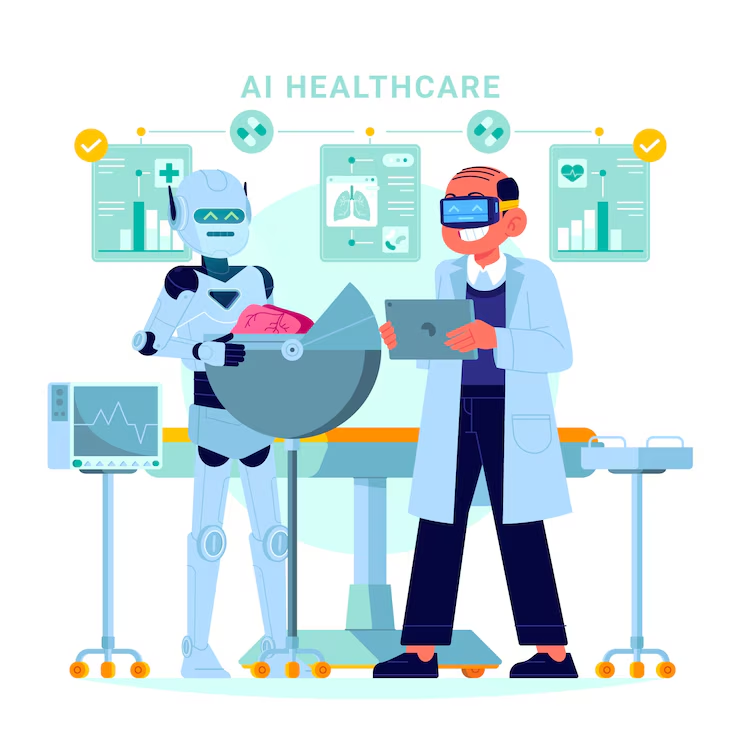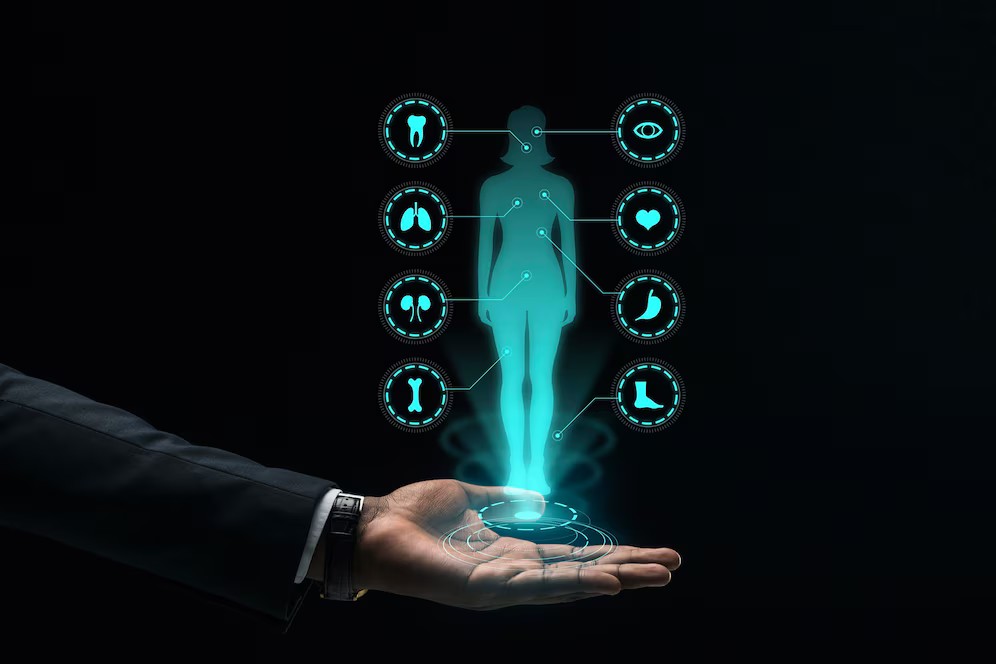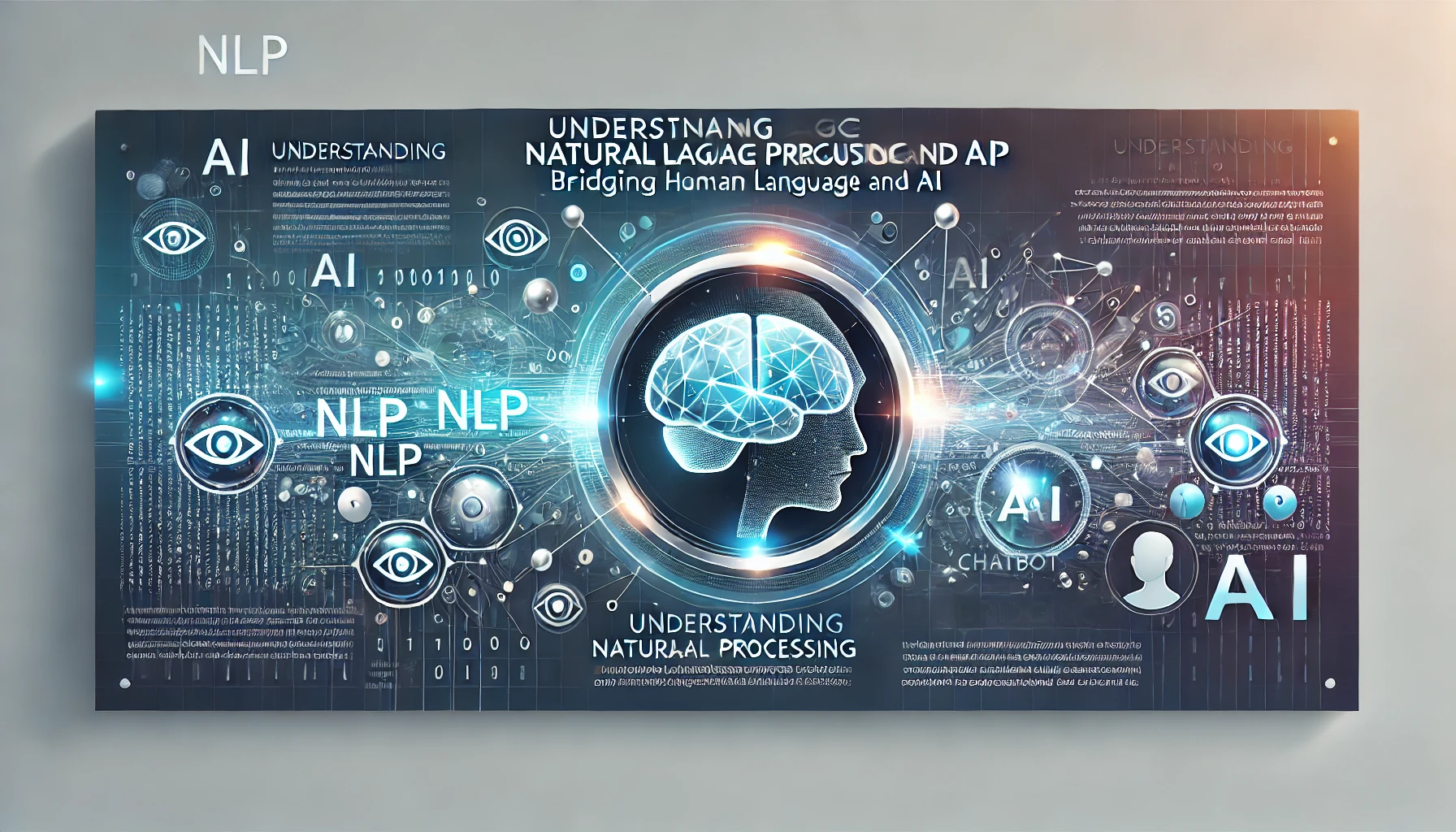Artificial intelligence (AI) is reshaping industries worldwide, and its role in healthcare is nothing short of revolutionary. By leveraging advanced algorithms and machine learning, AI is tackling significant challenges in the medical field. These include diagnostic precision and treatment personalization. However, the integration of AI into healthcare is not without its challenges, including ethical considerations, accessibility, and cost barriers.
In this article, we will explore the dynamic role of AI in healthcare. We will discuss its transformative impact and myriad applications. Additionally, we will examine the potential it holds for the future.
Understanding AI in Healthcare
What is AI in Healthcare?
AI in healthcare involves using machine learning, deep learning, and other computational technologies. These technologies assist medical professionals. They also enhance patient care. Unlike traditional computational models, AI systems can learn from data, improving their accuracy and performance over time.
Key Artificial Intelligence Technologies Transforming Medicine
- Machine Learning (ML): Used in predictive analytics and treatment recommendations.
- Natural Language Processing (NLP): Enables voice recognition for documentation and chatbot interactions.
- Computer Vision: Powers diagnostic tools in medical imaging and pathology.
- Robotics: Assists in surgeries and automates repetitive tasks.

Groundbreaking Applications of AI in Healthcare
How AI Revolutionizes Diagnostics in Healthcare
AI-powered tools are transforming diagnostics by analyzing data at a scale far beyond human capabilities. For instance, AI systems can detect cancer in its early stages by analyzing imaging data, leading to better outcomes.
Artificial Intelligence in Patient Care and Monitoring
From recommending treatment plans to predicting patient responses, AI optimizes therapies to individual needs. IBM Watson, for example, uses AI to provide oncologists with evidence-based treatment options.
AI in Patient Monitoring
Wearable devices like smartwatches use AI to monitor vital signs, alerting both patients and doctors about potential health concerns.
AI in Medical Imaging: A Game Changer for Healthcare
Revolutionizing Radiology
Radiologists are increasingly relying on AI to detect anomalies in imaging studies. AI algorithms can identify patterns in CT scans, MRIs, and X-rays, speeding up diagnostic processes.
Enhancing Accuracy in Imaging Diagnostics
AI reduces the chances of misdiagnoses, ensuring patients receive timely and accurate treatments.
AI in Drug Discovery
Accelerating Research
Traditional drug discovery can take years. AI shortens this timeline by analyzing vast datasets to identify potential drug candidates efficiently.
Reducing Costs in Drug Development
AI models significantly reduce the costs associated with drug research, making treatments more affordable for patients worldwide.
Personalized Medicine
Role of AI in Tailoring Treatments
AI allows for the customization of treatments based on an individual’s genetic profile, lifestyle, and medical history. This approach ensures better patient outcomes.
Benefits of Personalization
Personalized medicine minimizes side effects and maximizes the effectiveness of therapies, improving the quality of life for patients.
AI in Surgery
Robotic Surgeries
AI-enabled robotic systems like the da Vinci Surgical System enhance surgical precision, reduce human error, and improve recovery times.
Enhancing Precision and Safety
AI provides surgeons with real-time insights, enabling better decision-making during complex procedures.
Virtual Health Assistants
Chatbots in Healthcare
Virtual assistants powered by AI guide patients through symptoms, schedule appointments, and provide medication reminders, enhancing patient engagement.
Enhancing Patient Engagement
These tools make healthcare more accessible and reduce the strain on healthcare systems by addressing minor issues without human intervention.
FAQs
AI bridges the gap in rural and underserved areas by enabling telemedicine and remote patient monitoring, ensuring equitable healthcare delivery.
Risks include potential misdiagnoses, data privacy concerns, and overreliance on AI systems, necessitating robust oversight and safeguards.
AI assists professionals by automating repetitive tasks, providing diagnostic insights, and enabling precision treatments, allowing more focus on patient care.
Yes, AI analyzes data from various sources to forecast disease patterns, enabling proactive measures to prevent outbreaks.
AI supports mental health professionals with diagnostic tools and apps that provide therapy, track symptoms, and offer coping strategies.
By implementing transparent algorithms, rigorous testing, and strong data protection measures, ethical concerns can be effectively managed.
Conclusion
The role of AI in healthcare is profound, offering solutions to challenges that once seemed insurmountable. There are hurdles to overcome. However, AI has immense potential to enhance patient outcomes. It can also reduce costs and improve healthcare accessibility. Embracing AI is not just an opportunity but a necessity to ensure a healthier future for all.
Further Reading and Resources
To dive deeper into the role of AI in healthcare and its global impact, explore the following resources:
- World Health Organization (WHO)
The WHO offers valuable insights into how AI is improving healthcare systems globally. AI helps by addressing challenges like accessibility. It also assists in disease management. - National Institutes of Health (NIH)
Discover cutting-edge research on AI-driven healthcare solutions, including diagnostic tools and personalized medicine advancements. - Food and Drug Administration (FDA)
Learn about the latest guidelines for AI in medical devices. Understand its role in ensuring safety and compliance. - European Medicines Agency (EMA)
Explore regulatory policies and initiatives related to AI in medicine across Europe. - Stanford Center for Artificial Intelligence in Medicine and Imaging (AIMI)
Remain informed about groundbreaking research. This research focuses on AI for medical imaging and diagnostics.



